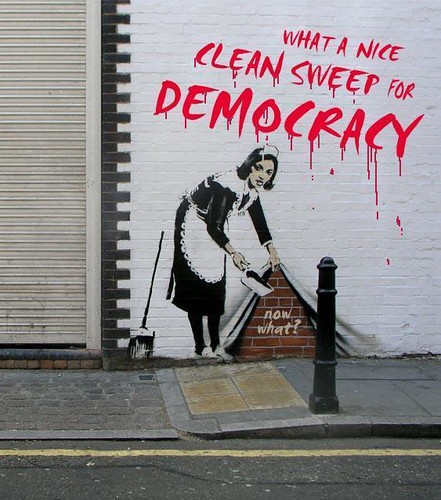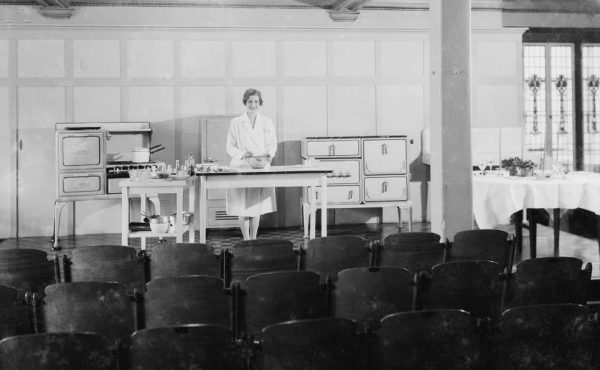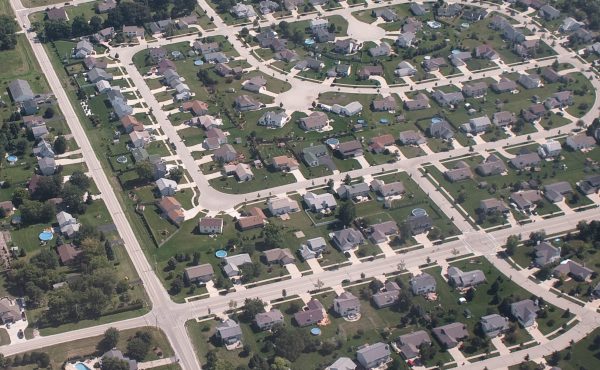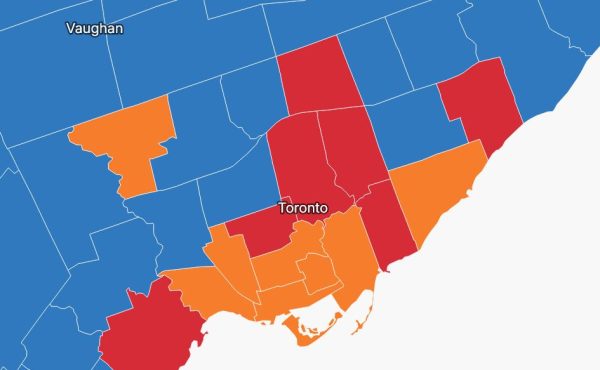
EDITOR’S NOTE: Wednesday is election day in Ontario. The importance of this election is huge for Toronto, and one of the most important aspects of this election is the referendum on MMP. Cross-posted from Spacing Votes.
– – – – – – – – – – – – – – – – – – – – –
Spacing will not endorse any candidate or political party as we head to the polls tomorrow. But we are not shy about our support for the Mixed-Member Proportional system proposed by the Citizens’ Assembly on Electoral Reform.
In recent years, urban concerns have not been well represented at Queen’s Park. In a political system that favours rural ridings over urban ones, Toronto and other urban regions have seen their influence marginalized, as they’ve suffered from a mixture of provincial indifference to outright vindictiveness. At a time when cities around the world are assuming more importance than ever, provincial politics have dragged urban regions backwards.
How would MMP affect this problem?
A fairer government means that by nature urban areas would be more represented in the provincial legislature. The thousands of urban votes that currently go to unsuccessful candidates would help to elect the 39 list MPPs. Toronto voters would be electing a large number of these new MPPs, purely by benefit of the city’s population. This means that the value of the Toronto vote to all parties would increase significantly. This extends to urban regions generally, as the decreased importance of ridings and the increased importance of individual voters would favor areas with high population density.
Parties would be obligated to tailor their platforms to urban voters in order to secure votes for list MPPs; “vote rich†areas would be as important as “seat rich†areas. Areas with a high population density will see their value increase, as their votes will be more consequential. The possibility of electing a party with an anti-urban platform would decrease, as urban elected list MPPs from other parties could compensate for any success such a party could have across the province. A party pursuing an anti-urban strategy would be doing so at great risk, given the increased power of the urban vote.
MMP would also allow for alterations to the province’s party makeup, and a Toronto or urban-oriented party could emerge to advocate on behalf of urban issues. This party could operate in a coalition or play “kingmaker,†helping a more successful party form a government and ensure that urban issues — transit, housing, uploading, etc. — are given priority in government. Such a party could have significant power in the legislature, able to work over time to ensure that urban concerns are heard.
Succinctly, urban voters would be less marginalized under MMP. They’ll have a greater say in provincial affairs, and could even elect local issue or pan-urban parties if they so choose. And while MMP isn’t a panacea for the problems of urban regions, it provides a real and improved opportunity for cities to articulate their concerns at Queen’s Park. For these reasons, Spacing supports switching Ontario to a mixed member proportional system. We hope you support this too.
On election day, say yes to MMP.
graffiti by Banksy




20 comments
Prove to me that a single one of these potential MMP MPs will actually represent urban concerns or be beholden to any constituency but the party leadership and you’ve got yourself a deal.
Unfortunately, nothing you’ve said convinces me that MPs elected through MMP will be anything but party mandrins, with no obligation or responsibility to do anything but tow the party line.
KATE >>
“a Toronto or urban-oriented party could emerge to advocate on behalf of urban issues. This party could operate in a coalition or play “kingmaker,†helping a more successful party form a government and ensure that urban issues  transit, housing, uploading, etc.  are given priority in government. Such a party could have significant power in the legislature, able to work over time to ensure that urban concerns are heard.”
Is that not enough to convince you? If Toronto has its own party, a la the Bloc Quebecois, then democracy will come to the urban vote. That paragraph is by far the most convincing argument for Toronto residents to vote for MMP.
“a Toronto or urban-oriented party could emerge to advocate on behalf of urban issues. This party could operate in a coalition or play “kingmaker,†helping a more successful party form a government and ensure that urban issues  transit, housing, uploading, etc.  are given priority in government. Such a party could have significant power in the legislature, able to work over time to ensure that urban concerns are heard.â€Â
Would such a party be able to get 3% of the vote (the minimum to get seats)?
Does any one know what the results in prior Ontario elections would have been like under this new scheme (and yes, I realize that you would have to use assumptions along the lines of party vote = popular vote)? Could you post the URLs?
Thanks
An urban-oriented party that appealed to TO, Hamilton, Ottawa, K-W, London, Windsor and whatever other urban centre I’m overlooking — I like their chances.
Why is a Banksy graff the pictoral for this piece? Why not something more local? Toronto has more than enough graphic artists who could supply, and Banksy is over-exposed anyways.
“Unfortunately, nothing you’ve said convinces me that MPs elected through MMP will be anything but party mandrins, with no obligation or responsibility to do anything but tow the party line.”
They where elected because the people of Ontario has voted their party. so you should expect and demand that they follow the party line.
If you don’t like the parties we have, once MMP is implemented, you will likely to have several more choices. If you still don’t like the choices, you can ignore the party ballot.
I appreciate the point Kate, but I’m unconvinced that list MPPs would be any differently beholden to the party than current MPPs are. Frankly, at the moment, all MPPs tow the party line – they’re elected and then are expected to stand on cue and take orders from the premier.
If a credible urban-oriented party emerged, it would be far more powerful under the current system than under MMP. This is true for any geographically-based interest group. Think of the Bloc Quebecois federally (the Official Opposition in 1993), or the PQ provincially, which managed to form a government a while back despite winning fewer votes than the provincial Liberals.
If any of you folks are serious about starting up a party like this, you should try to do it under the current system.
Actually, every voter and every region will be better represented, because every vote counts, no matter where you vote or how you vote.
Every party will elect MPPs from every part of the province. Every voter will have access, not just to one MPP, but to MPPs from every party.
The urban vote is still the minority vote in Ontario. Our rural and suburban populations are still greater, and yet are under-represented by seats because of their lower concentrations of wealth. MMP wouldn’t change that in favour of urban dwellers, and may in fact change that in favour of rural dwellers.
I’m personally against MMP because it allows the least-electable candidates to grab seats they couldn’t otherwise earn, by riding on the coattails of their party’s popularity.
And unless one party is VERY popular, MMP will result in fragmenting the vote even more then it already is. Coalitions? Nobody’s courting the NDP for their seats right now. Why would anybody court the Bouncing Bozo party for their one seat after an MMP-style election?
nothing you’ve said convinces me that MPs elected through MMP will be anything but party mandrins
Then why’d you vote for them, Kate?
Of all the objections to MMP, this one is the one that I find most… well, to be honest, I find it insults the intelligence of my fellow citizens.
I mean, I can understand if you think that a political party will stack its lists with hacks, morons who happen to be related, mouthbreathers who are owed one, and maybe a favored mistress or two.
But where the hell do you get the idea that people will want to vote that list into power? Do you think they’re stupid? Is it because you think they don’t give a damn? Is it because you think they’re fascinated by twinkling lights and their favorite colors, and will vote for whatever party use them in their logo?
Because really, I can’t see any outcome that combines “list full of useless party hacks” and “electoral success” that doesn’t require the voters to be moronic sheep.
Seriously, it takes a lot of effort to be that damn cynical. I can’t afford that energy. There’s housework to do, and shows to go to, and the occasional pie.
“But where the hell do you get the idea that people will want to vote that list into power?”
Because that’s exactly what MMP is designed to do: allow people to vote for their favourite party, and have any excess seats filled from the list in the way that the party chooses.
Granted, their list members and their method for filling seats with them will be published by the party before each election. But most voters typically don’t have a clear picture of their local candidates stand, let alone be familiar with all the hacks on the different parties’ B-lists.
Did you say there was pie?
The MMP is beneficial for many reasons, including the increased diversity of voter opinions that would have the opportunity to be heard. While I agree that many urban issues require improved representation, setting up a dichotomy between urban and rural is divisive and self-defeating. We need to recognize the interconnection between urban and rural issues to improve evryone’s quality of life. Do we not depend on rural areas for the very food that we eat? And what about those weekend getaways Torontonian’s are famous for; most are not in other urban areas. If we do not appreciate our rural counterparts and respect their struggles and understand how they are intrinsic to our urban quality if life, we risk making the entire province poorer: socially, economically and environmentally, rather than better off.
The MMP is beneficial because there will be more opportunity for ALL voices to be heard, not just urban ones.
Diane,
Coalitions would be a necessity under MMP. Otherwise there would be no functioning government.
Contrary to what has circulated, the list would be the last place someone really interested in a political career would want to be. There’s no job security – you’re basically anticipating that your party will do poorly locally if you hope to get elected from the list.
I think there’s also a delusion that somehow our current government isn’t being run by unelected political appointees. Aside from a few major ministers and the premier, the rest of the work is done by senior bureaucrats, advisers, and political staffers. Your average MPP has far less influence on policy than they do.
The combination of cynicism and naivete so often on display from Canadian voters is truly breathtaking, and disheartening.
“Frankly, at the moment, all MPPs tow the party line”
You mean ‘toe’ the party line… if they were towing it, then that might be considered a good thing! :^)
I dutifully read the Citizen’s Assembly report from cover to cover and I’m sold. Unfortunately, most people have been given the media editorial version of the plan, with all its fear mongering and misinformation. I guess I should have focused my volunteer time campaigning for MMP rather than my local candidate. I never received any flyers at home on the referendum except for the Elections Canada version. Was there any kind of door to door campaign on the issue?
Ooops – meant to say “Elections Ontario”. Must have been wishful thinking on my part…
Dave – I initially thought the same as you, but actually it turns out candidates can run BOTH for the list and in a local riding. So the list is a bit of a safety net – if your party does well, you’re likely to win a constituency, but if not, you may be able to get in through the list.
I think on balance MMP’s advantages outweigh its disadvantages, but I don’t think it does the cause any good to simply deny there are any potential problems and lash out at those who express reservations, as I’ve seen a minority of vocal MMP supporters do. I convinced someone at work to vote MMP by outlining my reservations, but then explaining why they were outweighed by the benefits. I don’t think claiming her concerns were completely groundless would have been as effective.
What is definitely frustrating is that there was not more information and debate about the idea.
Results right now:
Liberals: 41% of the vote, 69 seats.
Tories: 30% of the vote, 25 seats.
This comes the day after the Tories told people that they should vote down MMP.
I’m sure that Premier Dalton McGuinty thanks them, and four years from now, Premier Dalton McGuinty‘s next 40% majority will thank them again. I admire their principles, though – it takes a lot of guts to tell every Tory in the GTA to go to hell, suckers, you wasted your vote this time and we want to keep wasting your vote for decades to come.